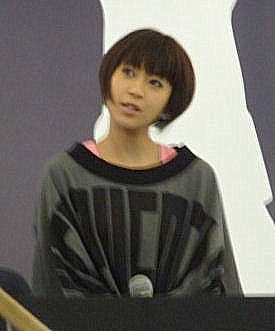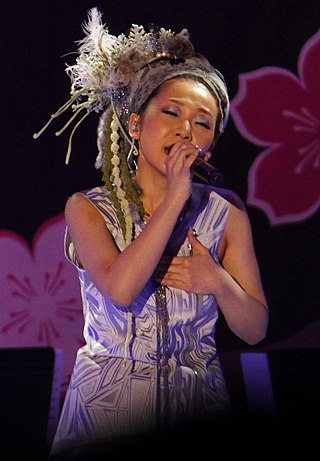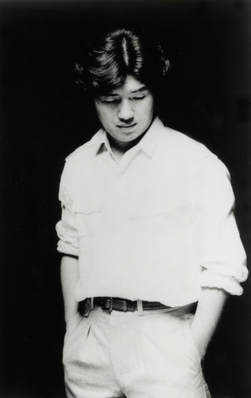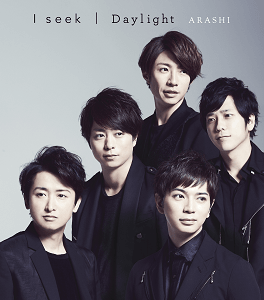
Happy End was a Japanese folk rock band active from 1969 to 1972. Composed of Haruomi Hosono, Eiichi Ohtaki, Takashi Matsumoto and Shigeru Suzuki, the band's pioneering sound was regarded as avant-garde to most Japanese at the time. They are considered to be among the most influential artists in Japanese music. MTV described Happy End's music as "rock with psych smudges around the edges."

Tatsurō Yamashita, occasionally credited as Tatsu Yamashita or Tats Yamashita, is a Japanese singer-songwriter and record producer, who is known for pioneering the city pop style of music.
Takashi Matsumoto is a Japanese lyricist and former musician. After several years playing the drums in the rock bands Apryl Fool and Happy End during the late 1960s and early 1970s, Matsumoto decided to focus on writing lyrics for others in 1974. As of 2015, he had written over 2,100 songs, 130 of which entered the top 10 on the Oricon chart. Total sales of the singles he has written exceed 49.8 million copies, making him the third best-selling lyricist in Japan. In 2017, he was awarded the Medal with Purple Ribbon from the Japanese government for his work in music.

AAA are a 5-member Japanese pop group signed to the label Avex Trax which debuted in September of 2005. The name has the meaning of "challenging everything" or "against all odds", and the group is marketed by their label as a "super performance unit".

The discography of Japanese-American R&B and pop singer Hikaru Utada consists of eleven studio albums, three compilation albums, eleven video albums and numerous singles and promotional singles. Utada began as a musician in the early 1990s as a member of U3, a family unit made up of her, her mother Junko Utada, also known as 1970s enka singer Keiko Fuji, and her father, musical producer Teruzane Utada. U3 released their debut album Star in 1993, with the hope to debut in America. In 1996, the group was rebranded as Cubic U, an R&B project focusing on Hikaru Utada, resulting in the English language album Precious in 1998 with record label Toshiba EMI.

The discography of Japanese R&B singer Misia consists of nine studio albums, three compilation albums, one extended play (EP), one live album, six remix albums, twenty-six singles, twelve promotional singles, eighteen video albums and thirty-seven music videos. In 1997, Misia signed a recording contract with BMG Japan and joined the then up-and-coming talent agency, Rhythmedia. Under the sub-label Arista Japan, Misia released her first single, "Tsutsumikomu Yō ni..." in February 1998, followed by "Hi no Ataru Basho" in May. In June, her debut album, Mother Father Brother Sister, opened at number three on the Oricon chart. The album peaked at number one three weeks later and stayed in the top five for eleven consecutive weeks. Mother Father Brother Sister was certified double million and won a Japan Record Award for Best Album, as well as a Japan Gold Disc Award for Pop Album of the Year. In 2000, Misia's second studio album, Love Is the Message, debuted at number one and was certified double million. It won a Japan Record Award for Best Album and a Japan Gold Disc Award for Pop Album of the Year. The album spawned three top ten hits: "Believe," "Wasurenai Hibi" and "Sweetness." Misia's first remix album, Misia Remix 2000 Little Tokyo, was released three months later and shot to number one. It sold over 800,000 copies and is the second best-selling remix album of all time in Japan.
The discography of Yumi Matsutoya, a Japanese singer-songwriter, consists of thirty-nine studio albums and EPs, forty-one singles, two live albums, and several compilation albums. It also denotes her early four albums and seven singles that were released under her maiden name Yumi Arai.
Motoharu Sano, is a Japanese singer-songwriter and musician. A graduate of Rikkyo University, Sano is a frontman with a history of performing in several bands which feature music both in Japanese and occasionally, English, playing songs that often have a rock and roll sound to them. In 2007, Rolling Stone Japan ranked his album Someday number 11 on a list of the greatest Japanese rock albums of all time.

Eiichi Ohtaki was a Japanese musician, singer-songwriter and record producer. He first became known as a member of the rock band Happy End, but was better known for his solo work which began in 1972. In 2003, Ohtaki was ranked by HMV Japan at number 9 on their list of the 100 most important Japanese pop acts. Patrick Macias referred to Ohtaki as Phil Spector, Brian Wilson, George Martin and Joe Meek "synthesized into a single human being," and called his work "an encyclopedia of everything that was great about pop music in the 20th century."
Eiichi is a masculine Japanese given name. Notable people with the name include:

Happy End is the third and final album by Japanese folk rock band Happy End. It was recorded in Los Angeles, produced by Van Dyke Parks and features several American session musicians such as Lowell George and Bill Payne of the band Little Feat.
"Otona Jellybeans" is the second single by Mayu Watanabe, released in Japan on July 5, 2012.
The year 2013 in Japanese music.
The discography of Japanese singer Masayuki Suzuki includes 16 studio, 6 compilation, 4 cover albums, a live album, 10 video albums, and 36 singles. Inspired by Western R&B acts and doo-wop songs, Suzuki formed a band Chanels in 1975, along with his friends and released their debut single "Runaway". Chanels would later be renamed to Rats & Star. In 1986, Suzuki made his solo debut through Mother of Pearl.
Taeko Onuki is a Japanese singer and songwriter. She is influential in the city pop genre.

"I Seek/Daylight" is the 49th single by Japanese boy band Arashi. It was released on May 18, 2016 under their record label J Storm. "I seek" was used as the theme song for the drama Sekai Ichi Muzukashii Koi starring Arashi member Satoshi Ohno, and "Daylight" was used as the theme song for the drama 99.9 Keiji Senmon Bengoshi starring Arashi member Jun Matsumoto. The single sold over 737,000 copies in its first week and topped the weekly Oricon Singles Chart. "I seek/Daylight" was certified for Triple Platinum by the Recording Industry Association of Japan (RIAJ).

"Tsubomi" is a song by Japanese folk rock band Kobukuro. It is their 15th single and is included on its ninth studio album 5296. The song was written and composed by Kentarō Kobuchi. The single was released on March 21, 2007, in two editions: a CD-only edition and a limited edition. It debuted at number two on the weekly Oricon Singles Chart before topping the chart the following week, and it was certified double platinum by the Recording Industry Association of Japan (RIAJ), denoting shipment of 500,000 units. "Tsubomi" earned the Grand Prix award at the 49th Japan Record Awards.

Are You Happy? is the fifteenth studio album of the Japanese idol group Arashi. The album was released on October 26, 2016 under their record label J Storm in two editions: a first press/limited edition and a regular edition. The regular edition comes with a 36-page lyrics booklet and the limited edition comes with an 80-page photo lyrics and a bonus DVD with the music video and making-of for "Don't You Get It?". The album sold over 636,000 copies in its first week and topped the Oricon charts. With more than 720,000 copies sold, the album was certified for Triple Platinum by the Recording Industry Association of Japan (RIAJ). It was released digitally on February 7, 2020.

The 23rd Japan Record Awards ceremony was held on 31 December 1981 at the Imperial Theatre, Tokyo, and was broadcast live in Japan through the TBS Television network. The broadcast ran from 19:00 (JST) to 20:54 (JST). Keizō Takahashi hosted the ceremony for the thirteenth time.

Enka is the enka cover album by Japanese singer Akina Nakamori. It was released on 27 June 2007 under the Universal Music Japan. It is Nakamori's fourth cover album.












